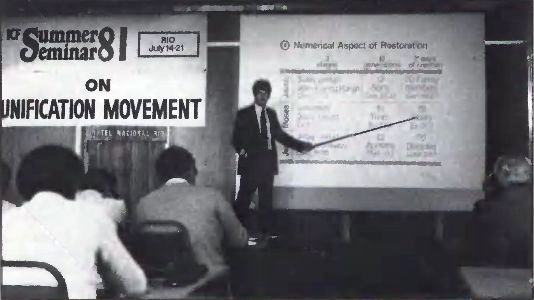![]()
The Words of the Byrne Family
|
|
The Words of the Byrne Family |

The fan-walled tower of the Hotel Nacional in Rio de Janeiro was the location of a seminar sponsored by the International Cultural Foundation on the Unification movement from July 14 through 20. Above us soared spectacular mountains, and in front was the ever-beating surf.
Attending the seminar were Brazilian professors from assorted disciplines. For almost all of them, it was their first encounter with the Unification movement. Some reports about the movement had been published in the news media a short while before the seminar. These included the sensational items published a short time before in the United States and resulted in quite a few professors declining the invitation.
The professors had been invited by Francisco Squizzato, a family member and a lawyer. A participant in the first 120-day workshop in New York, Francisco had left early to return to Brazil and make preparations for this seminar. The three or four months he spent contacting professors resulted in 100 attending the seminar.
About ten Brazilian family members worked with us on the seminar staff. The lecturers were, for the most part, European graduates of the Unification Seminary at Barrytown who are Ph.D. candidates. Originally, a team of American graduate students was to lead the seminar, but when they were refused the necessary visas by Brazil, Europeans (who did not need visas) took their place. Our biggest hurdle was language.
We knew little Portuguese and few Brazilians spoke English. Our translator from Portugal had to work hard to make verbal communication possible.
The seminar featured the regular Divine Principle lectures, very professionally presented, supplemented by summary presentations of Unification Thought and VOC. Lectures were followed by question and answer sessions, and the evenings were set aside for group discussions. These latter were very helpful in clearing up unanswered questions and expanding the understanding of the seminar guests.
Apart from a half dozen professors who were critical either because they felt we were in error from a Christian point of view or that our presentation was not sufficiently complete, the great bulk of the participants were very friendly and supportive. Some came very close to us. Attitudes were dramatically manifested after the last lecture, when a heated debate broke out among participants centering on their suspicion that one professor was planning to publish an unfriendly report of the seminar. The upshot of it was a strong and practically unanimous spontaneous expression of support for our goals, idealism and high standards, even if the participants did not agree with everything we taught. Later on that evening, we had our farewell dinner -- a very warm, happy and even moving event. Staff and participants sang, embraced and said good-bye as if they were members of each other's families.
One other element should be mentioned in this analysis. Ours was a very luxurious hotel. Just up the street, flush with the mountainside, was a favella, a slum consisting of hundreds or thousands of tiny shacks built from flimsy material, housing unemployed and illiterate people who have come to the city in an effort to escape the grinding poverty in the country. Typical of Latin American cities, the contrast between the favella and the hotel expresses the sharp polarization in Brazil between the small class of wealthy people and the enormous class of very poor. In between is a small city-based middle class. This stratification was reflected in the right- and left-wing viewpoints held by various seminar participants. Some expressed strong opposition to capitalism (and we were aware of anti-American feelings). When pressed, they generally rejected Marxism too, but if they had to, they would choose it rather than "savage capitalism." The need for a God-centered moderate solution is very pronounced.